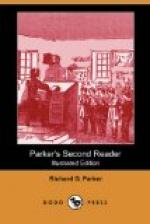2. The little birds promised their mother that they would listen very attentively, and inform her of every word they should hear.
3. She then went abroad; and on her return, the little birds said to their mother, Mother, you must take us away from here; for while you were gone we heard the farmer tell his sons to go and ask some of his neighbors to come to-morrow morning early, and help them cut down the corn.
4. Is that what he said? asked their mother. Yes, mother, said the little birds; and we are very much afraid that you cannot find a safe place for us before the farmer and his neighbors begin to cut down the corn.
5. Do not be afraid, my children, said the lark; if the former depends on his neighbors to do his work for him, we shall be safe where we are. So lie down in the nest, and give yourselves no uneasiness.
6. The next day, when the mother went out for food, she directed the little ones again to listen, and to tell her all that they should hear.
7. In the evening, when she returned, the little ones told her that the farmer’s neighbors did not come to assist him on that day; and that the farmer had told his sons to go and request his friends and relations to come and assist him to cut down the corn, early in the next day morning.
8. I think, my children, said the lark, we shall still be safe here; and we will, therefore, feel no anxiety or concern to-night.
9. On the third day, the mother again charged the young larks to give her a faithful report of what was done and said, while she was absent.
10. When the old lark returned that evening, the little larks told her that the farmer had been there, with his sons, early in the morning; but, as his friends and relations had not come to assist him, he had directed his sons to bring some sharp sickles early in the next morning, and that, with their assistance, he should reap the corn himself.
11. Ah! said the mother, did he say so? Then it is time for us to prepare to be gone; for when a man begins to think seriously of doing his work himself, there is some prospect that it will be done; but if he depends on his friends, his neighbors, or his relations, no one can tell when his work will be done.
12. Now, this little story is called a Fable. It cannot be true, because birds do not and cannot speak.
13. But, although it is not true, it is a very useful little story, because it teaches us a valuable lesson: and that is, that it is best to do our own work ourselves, rather than to depend upon others to do it for us; for, if we depend upon them, they may disappoint us, but whatever we determine to do for ourselves, we can easily accomplish, if we go right to work about it.
LESSON XX.
Dogs.—ORIGINAL.
1. I never knew a little boy that was not fond of a dog, and I have never seen many dogs which were not fond of little children.




